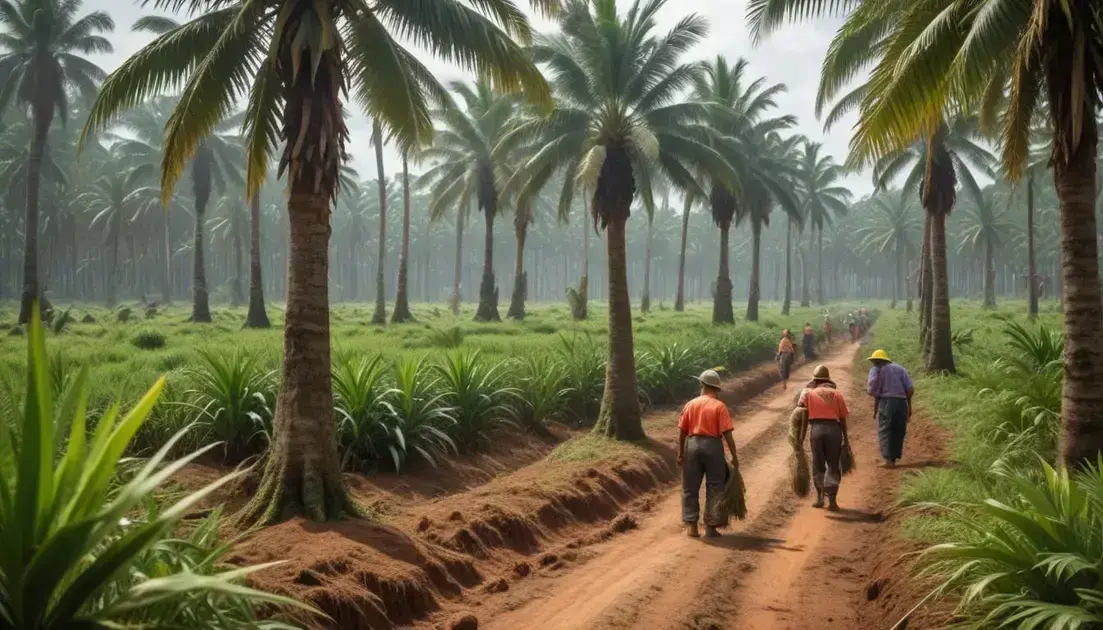CIMB’s New Partnership for Sustainable Palm Oil
Sustainable palm oil production focuses on reducing environmental impact while improving the livelihoods of small producers through innovative partnerships, financial support, and initiatives like CIMB’s commitment to net zero emissions and the SPIRAL Program.
The collaboration between CIMB Bank and Wild Asia aims to promote sustainable palm oil production. How will this partnership impact smallholders and the environment?
Supporting Small Producers
Supporting small producers is crucial for the growth of sustainable palm oil initiatives. These farmers often face significant challenges, including limited access to resources and market opportunities. By empowering them, we can enhance their productivity and sustainability practices.
One effective method is providing training on eco-friendly farming techniques. This helps smallholders improve crop yields while ensuring minimal environmental impact. Additionally, financial support through microloans or subsidies can enable these farmers to invest in better equipment and sustainable practices.
Partnerships between organizations like CIMB and local communities play a vital role in fostering these habits. By facilitating access to markets, small producers can sell their products at fair prices, boosting their income and overall quality of life. This economic empowerment helps build stronger communities committed to sustainable agriculture.
The collaboration can also promote the importance of transparency in supply chains. Ethically sourced palm oil not only benefits producers but also assures consumers of sustainable practices, contributing to a more responsible industry.
The MoU and SPIRAL Program
The signing of the Memorandum of Understanding (MoU) marks a significant step towards promoting sustainable practices in the palm oil industry. This agreement aims to implement the SPIRAL Program, designed to support smallholders in enhancing their sustainability initiatives while improving their livelihoods.
One key aspect of the SPIRAL Program is providing targeted training sessions for farmers. These sessions focus on best practices in cultivation, pest management, and soil health. By educating smallholders, the program fosters a deeper understanding of sustainable methods that can lead to higher yields and better environmental practices.
Moreover, the MoU emphasizes collaboration among various stakeholders, including local communities, NGOs, and financial institutions. This multi-faceted approach encourages knowledge sharing and resource accessibility, essential for achieving long-term sustainability goals. With collective efforts, stakeholders can create a more resilient supply chain.
Regular assessments under the SPIRAL Program will also help track progress and impact. By monitoring the implementation of sustainable practices, CIMB and its partners can ensure that the initiative remains effective and adapts to the evolving needs of small producers. Ultimately, the SPIRAL Program embodies a commitment to fostering responsible palm oil production, aligning economic growth with environmental sustainability.
Financial Solutions for Sustainable Growth
Financial solutions play a crucial role in fostering sustainable growth in the palm oil sector. Access to funding enables small producers to adopt environmentally friendly practices while ensuring their economic viability. Through tailored financial products, farmers can invest in sustainable technologies and resources that enhance productivity.
Microloans and grants are essential tools that provide smallholders with the necessary capital to implement better farming techniques. These funds can help in purchasing organic fertilizers, improving irrigation systems, and acquiring high-quality seeds. By streamlining these investments, farmers increase their yields and reduce their negative impact on the environment.
A partnership between banks and local financial institutions can facilitate the development of these financial solutions. Such collaborations can create tailored packages that cater specifically to the needs of smallholders engaged in sustainable palm oil practices. Providing easy access to funds is vital for empowering small producers.
Furthermore, capacity-building initiatives can educate farmers on financial literacy, enabling them to make informed decisions about investments. By understanding financial management, smallholders can better navigate the challenges of the market, ensuring a sustainable and profitable future for themselves and the environment.
Measuring GHG Emissions
Measuring greenhouse gas (GHG) emissions is essential for promoting sustainable palm oil practices. Understanding these emissions helps stakeholders identify areas for improvement and implement strategies to reduce their environmental footprint. Accurate measurement techniques allow producers to assess their impact on climate change.
Establishing baseline emissions is a critical first step. Producers can then monitor changes over time, assessing the effectiveness of various sustainability initiatives. This ongoing evaluation is crucial for achieving long-term sustainability goals and demonstrating accountability.
Technologies such as satellite imaging and remote sensing are increasingly used to assess land use changes and related emissions. By utilizing these tools, palm oil producers can gain insights into deforestation and land conversion, ensuring responsible practices.
Additionally, engaging in carbon accounting frameworks enables smallholders to quantify their emissions accurately. Participating in initiatives like the SPIRAL Program encourages producers to adopt best practices while effectively tracking their GHG outputs. With better data, farmers can optimize their operations, enhance productivity, and contribute to climate change mitigation.
Sharing this data with consumers and investors builds trust and transparency in the palm oil supply chain. As awareness of climate issues rises, businesses that actively measure and report on their GHG emissions will stand out and attract environmentally conscious partners and customers.
CIMB’s Commitment to Net Zero
CIMB Bank is dedicated to achieving net zero emissions, committing to sustainability and responsible banking practices in the palm oil industry. This goal is crucial as climate change continues to affect global ecosystems and agriculture. By adopting ambitious targets, CIMB aims to set an example for others in the financial sector.
The bank’s strategy includes financing sustainable projects and encouraging clients to adhere to environmentally friendly practices. This support for smallholders and producers in adopting sustainable palm oil practices can significantly reduce overall carbon footprints. CIMB provides access to financial resources that facilitate the transition to greener operations.
Working with partners and stakeholders, CIMB enhances the implementation of eco-friendly initiatives. For instance, the commitment to conduct regular assessments of GHG emissions aligns with international sustainability standards. By measuring and reporting their impact, CIMB fosters transparency and builds trust with consumers.
Moreover, CIMB encourages investments in renewable energy and sustainable technologies. By prioritizing funding for projects that contribute to biodiversity conservation and resource management, the bank strengthens the palm oil industry’s resilience against climate change.
CIMB’s commitment to net zero underlines the importance of collaboration across sectors. This holistic approach not only benefits the environment but also supports economic growth, creating a sustainable future for communities and industries alike.
In Conclusion
The growth of sustainable palm oil practices is essential for both the environment and the livelihoods of small producers. Through innovative partnerships and financial support, organizations like CIMB Bank are making strides towards achieving their net zero goals.
Promoting environmental responsibility not only benefits the planet but also enhances community resilience and economic stability. By measuring GHG emissions, providing training, and investing in sustainable technologies, the palm oil industry can transform into a more eco-friendly sector.
As we move forward, collaboration among all stakeholders will be vital. Together, we can create a sustainable future that supports small farmers and protects our natural resources.
Embracing these changes will help ensure that palm oil production is not only profitable but also sustainable for generations to come.
Frequently Asked Questions
What is the goal of CIMB Bank’s commitment to net zero?
CIMB Bank aims to achieve net zero emissions by promoting sustainability and responsible banking practices within the palm oil industry.
How does measuring GHG emissions benefit small producers?
Measuring GHG emissions helps small producers identify their environmental impact, enabling them to adopt better practices that reduce their carbon footprint.
What kind of financial support is available for sustainable palm oil producers?
Producers can access microloans and grants to invest in sustainable technologies and practices that enhance productivity while being environmentally friendly.
How does the SPIRAL Program assist smallholders?
The SPIRAL Program provides training and resources to help smallholders adopt sustainable farming practices, ultimately improving their livelihoods and environmental impact.
Why is collaboration important in promoting sustainable palm oil?
Collaboration among stakeholders strengthens initiatives, facilitates resource sharing, and ensures that sustainable practices are effectively implemented and monitored.
What technologies are being used to measure emissions in the palm oil industry?
Technologies like satellite imaging and remote sensing are used to assess land use changes and track GHG emissions accurately in the palm oil sector.





